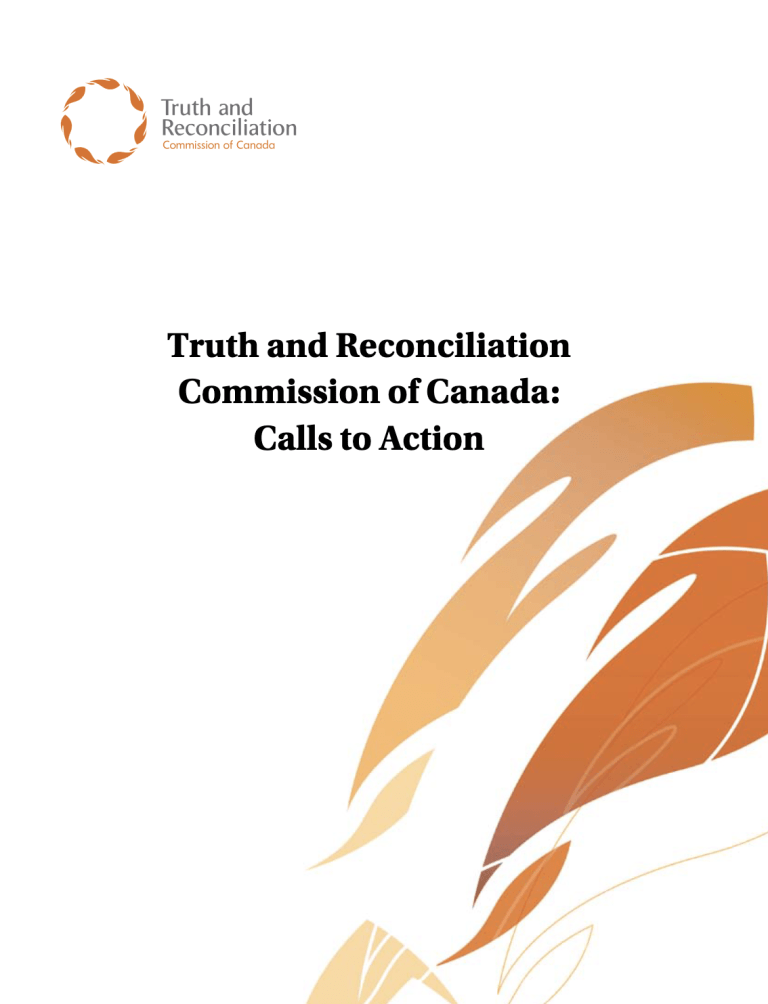22 search results
for
Children and youth
Legacy
Education
Recommendation 12: We call upon the federal, provincial, territorial, and Aboriginal governments to develop culturally appropriate early childhood education programs for Aboriginal families.-
Category and theme:
Audience:
Groups affected:
Location of recommendation:
Legacy
Language and culture
Recommendation 16: We call upon post-secondary institutions to create university and college degree and diploma programs in Aboriginal languages.-
Category and theme:
Audience:
Groups affected:
Location of recommendation:
Legacy
Health
Recommendation 19: We call upon the federal government, in consultation with Aboriginal peoples, to establish measurable goals to identify and close the gaps in health outcomes between Aboriginal and non-Aboriginal communities, and to publish annual progress reports and assess longterm trends. Such efforts would focus on indicators such as: infant mortality, maternal health, suicide, mental health, addictions, life expectancy, birth rates, infant and child health issues, chronic diseases, illness and injury incidence, and the availability of appropriate health services.-
Category and theme:
Audience:
Groups affected:
Location of recommendation:
Legacy
Justice
Recommendation 38: We call upon the federal, provincial, territorial, and Aboriginal governments to commit to eliminating the overrepresentation of Aboriginal youth in custody over the next decade.-
Category and theme:
Audience:
Groups affected:
Location of recommendation:
Legacy
Justice
Recommendation 41: We call upon the federal government, in consultation with Aboriginal organizations, to appoint a public inquiry into the causes of, and remedies for, the disproportionate victimization of Aboriginal women and girls. The inquiry’s mandate would include:- Investigation into missing and murdered Aboriginal women and girls.
- Links to the intergenerational legacy of residential schools.
-
Category and theme:
Audience:
Groups affected:
Location of recommendation:
Reconciliation
National Council for Reconciliation
Recommendation 55: We call upon all levels of government to provide annual reports or any current data requested by the National Council for Reconciliation so that it can report on the progress towards reconciliation. The reports or data would include, but not be limited to:- The number of Aboriginal children—including Métis and Inuit children—in care, compared with non-Aboriginal children, the reasons for apprehension, and the total spending on preventive and care services by child-welfare agencies.
- Comparative funding for the education of First Nations children on and off reserves.
- The educational and income attainments of Aboriginal peoples in Canada compared with non-Aboriginal people.
- Progress on closing the gaps between Aboriginal and non-Aboriginal communities in a number of health indicators such as: infant mortality, maternal health, suicide, mental health, addictions, life expectancy, birth rates, infant and child health issues, chronic diseases, illness and injury incidence, and the availability of appropriate health services.
- Progress on eliminating the overrepresentation of Aboriginal children in youth custody over the next decade.
- Progress on reducing the rate of criminal victimization of Aboriginal people, including data related to homicide and family violence victimization and other crimes.
- Progress on reducing the overrepresentation of Aboriginal people in the justice and correctional systems.
-
Category and theme:
- Decolonization and Indigenous rights ,
- Economic inequality ,
- Education and employment ,
- Health ,
- Health, wellness and services ,
- Indigenous children and youth in care ,
- Indigenous issues in policing and justice ,
- Mental health and detention ,
- Policing and the criminal justice system ,
- Poverty and economic inequality ,
- Pre-natal care ,
- Public services
Audience:
Groups affected:
Location of recommendation:
Reconciliation
Church apologies and reconciliation
Recommendation 58: We call upon the Pope to issue an apology to Survivors, their families, and communities for the Roman Catholic Church’s role in the spiritual, cultural, emotional, physical, and sexual abuse of First Nations, Inuit, and Métis children in Catholic-run residential schools. We call for that apology to be similar to the 2010 apology issued to Irish victims of abuse and to occur within one year of the issuing of this Report and to be delivered by the Pope in Canada.-
Category and theme:
Audience:
Groups affected:
Location of recommendation:
Reconciliation
Education for reconciliation
Recommendation 62: We call upon the federal, provincial, and territorial governments, in consultation and collaboration with Survivors, Aboriginal peoples, and educators, to:- Make age-appropriate curriculum on residential schools, Treaties, and Aboriginal peoples’ historical and contemporary contributions to Canada a mandatory education requirement for Kindergarten to Grade Twelve students.
- Provide the necessary funding to post-secondary institutions to educate teachers on how to integrate Indigenous knowledge and teaching methods into classrooms.
- Provide the necessary funding to Aboriginal schools to utilize Indigenous knowledge and teaching methods in classrooms.
- Establish senior-level positions in government at the assistant deputy minister level or higher dedicated to Aboriginal content in education.
-
Category and theme:
Audience:
Groups affected:
Location of recommendation:
Reconciliation
Education for reconciliation
Recommendation 63: We call upon the Council of Ministers of Education, Canada to maintain an annual commitment to Aboriginal education issues, including:- Developing and implementing Kindergarten to Grade Twelve curriculum and learning resources on Aboriginal peoples in Canadian history, and the history and legacy of residential schools.
- Sharing information and best practices on teaching curriculum related to residential schools and Aboriginal history.
- Building student capacity for intercultural understanding, empathy, and mutual respect. iv. Identifying teacher-training needs relating to the above.
-
Category and theme:
Groups affected:
Location of recommendation:
Reconciliation
Education for reconciliation
Recommendation 64: We call upon all levels of government that provide public funds to denominational schools to require such schools to provide an education on comparative religious studies, which must include a segment on Aboriginal spiritual beliefs and practices developed in collaboration with Aboriginal Elders.-
Category and theme:
Audience:
Groups affected:
Location of recommendation:
